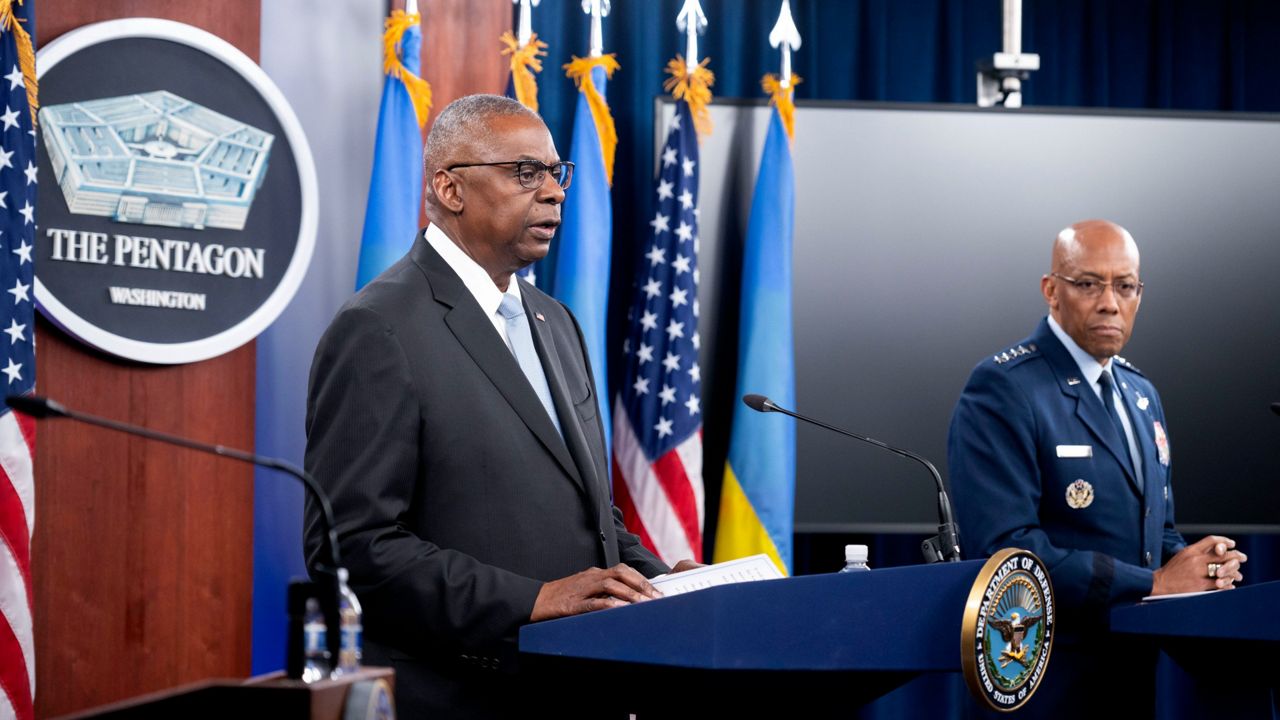More than two years into the war, a coalition of over 50 countries remains committed to ensuring Ukraine fends off Russia, U.S. Defense Secretary Lloyd Austin said Monday.
The Ukraine Defense Contact Group met virtually Monday morning to coordinate more military aid to Ukraine, as Kyiv tries to hold off a Russian offensive in the northeast while launching its own massive assault on the Russia-occupied Crimean Peninsula.
“[Russian President Vladimir] Putin is betting that eventually Ukraine will fall, and he's betting that this contact group will crumble,” Austin said at a Pentagon news conference. “But he's wrong.”
What You Need To Know
- A coalition of over 50 countries remains committed to ensuring Ukraine fends off Russia, U.S. Defense Secretary Lloyd Austin said Monday.
- The Ukraine Defense Contact Group met virtually Monday morning to coordinate more military aid to Ukraine
- Austin said much time Monday was spent discussing air defense systems that protect Ukraine against Russian missiles, drones provided by Iran and other weapons from North Korea
- Ukrainian troops have been fighting to halt Russian advances in the Kharkiv region, while also increasing their offensive attacks in Crimea
Austin said much time Monday was spent discussing air defense systems that protect Ukraine against Russian missiles, drones provided by Iran and other weapons from North Korea.
Defense leaders also talked about the long-term challenges facing Ukraine’s security, including “laying the foundation for Ukraine's future force, which must be strong and and sustainable enough to ward off future Russian aggression,” Austin said.
The American defense chief, meanwhile, committed to keeping U.S. weapons moving to Ukraine.
The U.S. announced no new aid packages Monday, even as Ukrainian forces continue to complain that weapons are just trickling into the country after being stalled for months due to congressional gridlock over funding. Pentagon officials have said that weapons pre-positioned in Europe began moving into Ukraine soon after the aid funding was approved.
It's unclear how much of that has reached some of the front lines, where Russian troops have intensified their assault.
In the three weeks since President Joe Biden signed the $95 billion foreign aid package, the U.S. has sent $1.4 billion in weapons pulled from Pentagon stockpiles and announced it was providing $6 billion in funding through the Ukraine Security Assistance Initiative. USAI pays for longer-term contracts with the defense industry and means that the weapons could take many months or years to arrive.
In recent packages, the U.S. has agreed to send High Mobility Artillery Rocket Systems (HIMARS) and rockets for them, as well as munitions for Patriot and National Advanced Surface-to-Air Missile Systems, artillery, anti-aircraft and anti-tank munitions, and an array of armored vehicles, such as Bradley and Mine Resistant Ambush Protected vehicles.
The U.S. is also providing additional coastal and riverine patrol boats, trailers, demolition munitions, high-speed anti-radiation missiles, protective gear, spare parts and other weapons and equipment.
And the State Department has approved a proposed emergency sale of HIMARS to Ukraine for an estimated $30 million. State said Ukraine has asked to buy three of the rocket systems, which would be funded by the government of Germany.
“We'll keep pushing to find swift solutions to Ukraine's most pressing needs,” Austin said.
“The outcome in Ukraine is crucial for European security, for global security and for American security,” he added. “None of us would want to live in a world where dictators redraw borders by force and launch wars of aggression to try to revive yesterday's empires.”
Ukrainian troops have been fighting to halt Russian advances in the Kharkiv region, while also increasing their offensive attacks in Crimea, including on military infrastructure sites on the Black Sea coast and in the Russian-occupied city of Sevastopol.
Ukraine has also struggled to get enough troops to the front lines, as the war drags on into its third year and fighting takes its toll. In an effort to increase troop numbers, President Volodymyr Zelenskyy signed two laws, allowing prisoners to join the army and increasing fines for draft dodgers fivefold. The controversial mobilization law goes into effect on Saturday.
Putin said Friday during a visit to China that Moscow's offensive in Ukraine's northeastern Kharkiv region aims to create a buffer zone but that there are no plans to capture the city.
Joint Chiefs Chairman Gen. CQ Brown Jr. said the U.S. believes the Russian offensive is designed to divert Ukraine’s focus from other critical areas.
“Ukrainian forces are fighting hard to hold against Russian advances across the frontlines,” Brown said. “Ukraine's reserves and stockpiles are being challenged as they defend against Russian offensive actions, which underscores the urgency of this coalition's work to just stay in Ukraine.
“This coalition will not turn,” Brown added. “We will not waver. We will not give up.”



